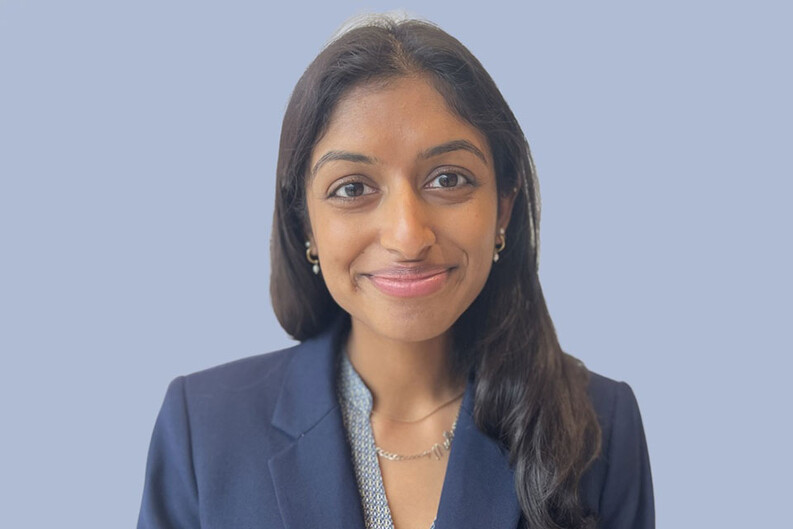Medha Swaminathan ’22: Expanding Options for Mental Health Response in Massachusetts

Medha Swaminathan ’22 is a current Liman Fellow working with the ACLU of Massachusetts in Boston to improve public health oversight in jails and to lessen the role of police in responding to mental health crises. At Yale Law School, she was a Coker Fellow as well as a student co-director and member of the Worker and Immigrant Rights Advocacy Clinic.
What problems does your work at the ACLU of Massachusetts (ACLUM) address, and how does your project respond?
Two potential legal avenues have the same objective: replacing carceral responses to public health crises with mechanisms that prioritize human health and dignity over punishment.
The first is to use the Americans with Disabilities Act (ADA) and to implement regulations to ensure adequate funding for municipal non-police mental health crisis response services. In Massachusetts, policy initiatives supporting alternatives to police for mental crisis response have made great strides, but more is needed. Building on the efforts of local community organizers, we are exploring what kinds of claims are available to require government funding to go towards non-police mental health crisis services. The ADA’s name itself makes the point; police responses to the mental health crisis are so inadequate that they should be understood to be a form of discrimination against people experiencing mental disabilities.
A second avenue is to provide data, through compilation and analysis of what exists on state prisons and jails, to support the development of a new, robust oversight body in Massachusetts. While facility- and individual-level litigation has mitigated some of the health risks of COVID-19 for people in prison, system-level change is required to guarantee that all carceral facilities are bound by consistent public health guidance; we need public health expertise in charge of these issues that have such a significant impact on health. I have surveyed models across the country to identify features of successful mechanisms to recommend their use in Massachusetts.
What challenges have you faced, and how have you responded to them?
It is hard to figure out which programs and initiatives will appropriately meet people's needs, are workable enough to be implemented, and will avoid creating the coercive and punitive dynamics inherent in the criminal legal system. These essential and community-specific considerations require ongoing conversations; the ones I have had thus far have been eye-opening.
What kind of impact have you had so far?
Thus far, I have synthesized legal and factual research to understand the structure of claims under the ADA. I have identified important questions to ask members of the community working with families affected by police violence and living in several of the State’s municipalities.
In addition, I have completed a 50-state survey and a draft report on what oversight mechanisms exist related to public health in prisons and jails. I have put this research into materials accessible to practitioners. I have also developed one- and two-page briefs to share with other nonprofit advocacy partners in the Commonwealth, as well as with state legislators in connection with potential legislative action.
I have also participated in litigation. I am working on an ACLU case focused on unlawful conduct by the police. I am a part of a team that represents a Boston man who was falsely arrested in his home by a Boston police officer, held in jail overnight, and faced criminal charges for months before the charges were dismissed. In February, the case went to trial in federal court, and I presented the opening statement, cross-examined an officer witness, and drafted and argued evidentiary motions. After a three-day trial, the jury unanimously found in the plaintiff's favor on several counts, including federal and state law claims for false arrest and false imprisonment and a state law claim for malicious prosecution; the jury awarded our client compensatory damages for the harm he suffered and punitive damages to condemn the officer’s conduct.
What have you gained from your fellowship experience thus far?
I am delighted to have a project and be able to “own” and shape my work. My favorite part of being a law student was participating in clinical work, because of the community and shared mission that was embedded into every aspect of the work, as well as the commitment to reflection and peer learning. I was nervous that as a project-based fellow primarily on my own, I would lack those team-based opportunities for continued education and growth. That has not happened, and I am grateful to be part of the broader Liman and ACLU communities, thanks to members of the Liman Center and my fabulous supervisor here in Massachusetts. This year has brought not only new and special experiences, such as seeing a case through discovery to a jury trial, collaborating with ACLU advocates beyond the legal department, and diving deep into an intensive research project, but has also given me confidence and agency as a new lawyer.


